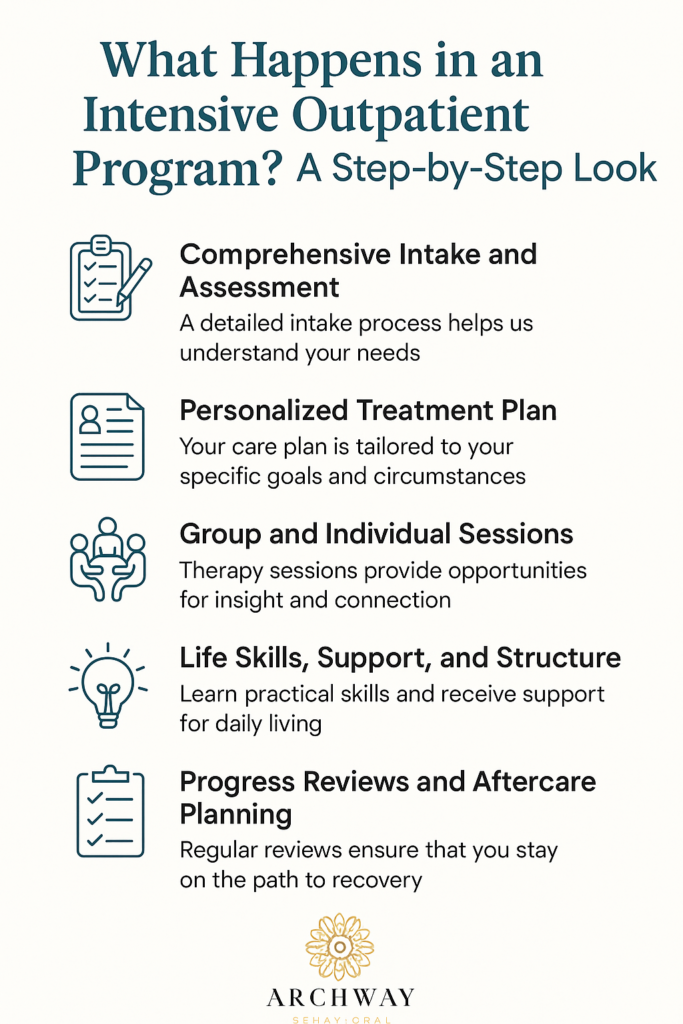Relapse can feel like erasing progress. But what if it’s actually part of the process?
If you’ve been through treatment before—maybe even built up a few steady months—you know what it feels like to have that footing fall out from under you. The shame. The doubt. The fear that maybe you “wasted” your shot.
But here’s the truth: You didn’t ruin anything. You’re still here. And that matters more than perfection ever will.
At Archway Behavioral Health, we believe relapse isn’t the end. It’s a signal that something needs more attention, more care, or just a new approach. That’s where Intensive Outpatient Programs (IOPs) come in.
If you’re considering returning to care after a relapse, here’s exactly what to expect from an IOP—without shame, without judgment, and with full transparency.
What Is an Intensive Outpatient Program (IOP)?
An Intensive Outpatient Program is a flexible but structured treatment option. It typically involves attending therapy sessions multiple times per week—usually three to five days, for around three hours each visit.
IOPs offer more support than a weekly therapy session but don’t require you to live onsite like residential or inpatient treatment. That makes it a good fit if:
- You’ve recently relapsed and want to regain stability
- You’re transitioning out of inpatient care
- You need a structured environment without leaving work or family responsibilities
IOPs allow you to live at home, work a job, or care for your family—while still receiving a high level of clinical and emotional support.
Step 1: The Intake Process — Understanding What You Need Now
Coming back after relapse can be awkward. We know. But our intake process is designed to meet you where you are, not where you “should” be.
During intake, our team listens. We ask questions—but not just to check boxes. We’re looking to understand your unique experience this time around:
- What triggered the relapse?
- How has your mental health been?
- What support systems are still in place—or no longer there?
This assessment allows us to co-create a treatment plan that’s relevant, respectful, and responsive to what you actually need.
“They didn’t treat me like I failed. They treated me like someone who was still worth helping.”
– Outpatient Client, 2023
Step 2: Building a Tailored Treatment Plan
Based on your intake, you’ll work with our clinical team to develop a plan that supports your goals and healing.
This plan may include:
- Individual Therapy – One-on-one sessions to address personal challenges, relapse triggers, and deeper emotional work
- Group Therapy – A supportive environment where you can share experiences and learn from others
- Family Counseling – If appropriate, we help rebuild trust and communication with loved ones
- Medication Management – If mental health or withdrawal symptoms are a concern, our psychiatric team can help
The goal? To create a treatment experience that fits your real life, not just your ideal one.
Step 3: Weekly Schedule — A Rhythm of Recovery
Most IOPs operate Monday through Friday and offer both daytime and evening sessions. This allows you to keep up with daily responsibilities while staying grounded in a recovery routine.
Your schedule might include:
- 3–5 weekly sessions
- 3 hours per session
- A mix of individual, group, and specialized sessions
Each day has a rhythm. There’s structure, but also breathing room. You’ll learn coping skills, build emotional insight, and receive validation from peers walking a similar path.
IOP isn’t about restarting from zero—it’s about building from what you already know, with new tools and a wider lens.
Step 4: Life Skills and Real-World Support
Treatment isn’t just about managing cravings. It’s about reentering your life with new strategies and support. At Archway, our IOP includes practical tools for:
- Setting boundaries at work or home
- Managing emotional triggers
- Handling stress without substances
- Creating realistic routines
- Navigating life after relapse without shame
We also help with logistical challenges like transportation, scheduling, or referrals to additional services. You’re not expected to juggle everything alone.
Step 5: Monitoring Progress and Planning Next Steps
Your progress is checked regularly—but not in a punitive way. Instead, we talk through what’s working, what feels hard, and what needs to shift.
As you build stability, your care team will help you plan for aftercare. That might include:
- Ongoing therapy
- Alumni support groups
- Sober housing recommendations
- Job training or education support
There’s no sudden “you’re done” moment. We stay with you through the transition.
Why IOP Can Be a Powerful Reset After Relapse
Coming back after a relapse takes courage. And it helps to return to a space that respects your effort and capacity. Here’s why IOP is often a strong next step:
- You already know the basics — IOP builds on your foundation without repeating everything.
- You stay connected — Peer groups remind you that you’re not the only one navigating this.
- You get to keep your life moving — Work, family, and responsibilities don’t have to stop.
Most importantly, you’re not treated like you failed. You’re treated like someone who still deserves care—and is still capable of healing.
FAQ: Common Questions About Intensive Outpatient Programs
Is IOP the same as outpatient therapy?
No. IOP involves more hours and greater structure than standard outpatient therapy. It’s designed for people who need more support than one or two therapy sessions a week.
Will I have to talk about my relapse in group?
Only if and when you’re ready. Group therapy is designed to be supportive—not forced. Many people find it helpful to process relapse openly, but it’s always your choice.
Can I work while attending IOP?
Yes. IOP is designed to be flexible. Many people attend evening or daytime sessions around their work schedules.
Is this just for people who’ve never been to treatment?
Not at all. Many IOP clients are returning after a relapse or a tough period. We honor the work you’ve done—this isn’t about starting over.
What if I need more support than IOP offers?
If IOP isn’t the right level of care, we’ll help you explore other options like partial hospitalization (PHP) or residential treatment. We’ll make sure you land in the right place, not just the next place.
The Path Back Isn’t Punishment—It’s Possibility
You don’t have to re-earn your seat here. You’re still worthy of care, still capable of change, and still part of this community. If you’re wondering whether you can do this again—the answer is yes. And we’re here to walk with you.
📞 Want to talk through your options? Call Archway Behavioral Health at (888) 530-0227.
Our IOP team is ready to support your return to care—with dignity, clarity, and zero judgment.



